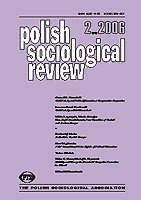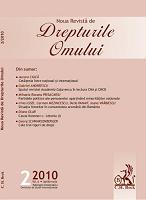
Growing of the Light
Growing of the Light
The "White Phase" of Petar Mazev: From Experiment to Paradigm
More...
The "White Phase" of Petar Mazev: From Experiment to Paradigm
More...

Zvonko Taneski, "Chocolate in a Portfolio", Blesok, 2010, 112 p.
More...




Звонко Танески. „Чоколада во портфолио“ – Скопје: БЛЕСОК, 2010, 112 стр.
More...Keywords: self; philosophy; psychology
This article was written during a time of economic upheaval, which usually meant during times when many countries were negatively effected by results generated from the United States of America. The history of the concept of self in the West was surveyed, with specific emphasis then added for self within existential and humanistic psychology. The currency of the concept was then visited within the theory of Albert Ellis in both the thin and broad senses. Implications and antidotes for self-rating were then discussed. A sidelong glance was then paid to relationship ontology
More...Keywords: classroom assessment; teacher education; engineering education; authentic learning
This National Science Foundation supported project (initiated by colleges of Education and Engineering at a Southwestern university) provided pedagogical improvements in engineering education, and offered preservice teachers authentic classroom assessment experience. Preservice teachers enrolled in a semester-long assessment course observed a first-year introductory engineering course and conducted an assessment of engineering students’ learning using an analytic rubric. At the completion of the semester, the preservice teachers reflected on their authentic learning experience, and suggested pedagogical changes in engineering students’ instruction. Presented are the results of the joint initiative as well as the implications for offering authentic learning and assessment experiences to preservice teachers during their teacher preparation program.
More...Keywords: rapist; emotions; cognitions; myths; typologies
The present article tries to point out in a comprehensive manner mainly the results of the researches related to the way rapists tend to think and feel. There are also included typologies, myths, cognitive distortions, attitudes and factors implied in the phenomena.
More...Keywords: cancer; causal atribution; depression; social support
Causal-attributions focuses on the human need to understand, give meaning to, and ascribe causation to unexpected and unfortunate life events. Cancer is a stressful event that affects not only interpersonal relationships, but the ways to explain and experience life. The aim of this study was to evaluate the causal attributions for different type of cancer and their implications in the subsequent psychological and psychopathological manifestations related to cancer. At this study participate a sample of 120 patients with different type of cancer, aged between 36 to 70 years old. The following instruments were used: Beck Depression Inventory, Attributional Style Questionnaire, Multidimensional Scale of Perceived Social Support, Current Thoughts Scale, Satisfaction With Life Scale. The study contributes to the expansion and application of learned helplesness theory in psycho-oncology and, in addition, underline psychopathological mechanisms that occurs during the disease.
More...Keywords: automatic; unconscious; controlled; preattentional; postattentional
Very frequent in psychological literature, terms as automatic, unconscious and preattentional are used as synonymous. But do these different words have the same meaning? Than why do we use all of them? Or are them different realities? The rows below are a synthetic article that intends to clarify this point by analyzing different perspectives on automaticity. In response, we concluded that the superposition between the mentioned concepts is only partial, depending on the particular type of task in use. Finally, qualitative and quantitative differences between automatic versus controlled processing are argued.
More...Keywords: time experience; exploratory factor analysis; confirmatory factor analysis
The Temporal Experience Questionnaire (TEQ) was constructed by Ricks, Epley and Wessman, (1973) in order to asses the way in which people behave in time restricted situations and also measure the attitude people may have towards time. This paper presents the findings of a study undertaken to adapt the TEQ for the Romanian population. A sample of 642 subjects, 321 male and 321 female, were used. Based on exploratory and confirmatory factor analysis a four factor model was obtained. Results show adequate construct, convergent and discriminant validity of the adapted instrument as well as acceptable internal consistency for each scale. Test-retest coefficients (for a three month period) were very high.
More...Keywords: bronchial asthma; personality; pathology
Bronchial asthma is an inflammatory disease of the respiratory tract, especially of the bronchia. In the last ten years, researches have showed that bronchial asthma is an inflammatory disease of the bronchia which leads to significant changes in the treatment of the illness. The aim of the present study is to reveal the link between different psycho-social factors and the manifestation and evolution of the bronchial asthma. The two samples of the study consisted of 30 people diagnosed with bronchial asthma and 30 healthy people. The subjects were administered two psychological tests: the Freiburg Personality Inventory and the Symptom Check List. Significant differences have been observed between the two samples regarding the prominent features of personality; in addition, psychopathological traits occurred as a consequence of the illness. The psychological factors can also be included in the category of factors which play a role in the adaptation of the asthmatic patient to the chronic character of the illness besides age, the severity of the illness and the complexity of the treatment measures.
More...Keywords: psychological well-being; meaning in life; Romanian; British
According to the Self-Determination Theory, the negative effects of the extrinsic motivational orientation should be stronger in cultures which emphasize extrinsic aspirations. We used a Romanian sample and a British sample to test whether national well-being has direct effects on psychological well-being. We took measures of intrinsic and extrinsic motivation, life satisfaction, affect, and meaning in life. The results were surprising, showing higher levels of intrinsic motivation for the Romanian sample, and lack of differences for well-being components.
More...Keywords: self-report; assessment; anxiety
Simplicity and ease of administration have made anxiety self-reports one of the most popular assessment method among researchers and practitioners. Yet the fallibility of human memory and judgment has made this methodology the subject of much scrutiny and criticism. The current review aims to highlight both the advantages and limits of self reports in light of newly developed cognitive models of assessment (see Schwarz, 1999). Evidence suggests that, in order to edit their response to a self report question, participants must first understand it, then search their memory for relevant information, and finally translate their answer into a meaningful response. All these processes can be affected in undesirable ways by such factors as question order, question wording and available response options. The present paper thus discuss the processes that underlie self-reports, reviewing the distinct strength and weaknesses of this technique. Though valuable, anxiety self-report must not be view as the default or most desirable assessment method (as some researchers continue to see it), but rather as one assessment option among many others (i.e. behavioural, physiological, or implicit).
More...
Keywords: radicalism; populism; political parties; Central Europe; authoritarianism; democracy; system transformation
The object of this article is to discuss various forms of political radicalism in Central Europe after 1989. This issue is made important by this region's impact on the Old Continent in its modern history and particular intensification of this phenomenon in countries undergoing dramatic social changes, system transformation in this case. Focusing his attention on Poland, the Czech Republic, Hungary, Slovakia, Romania and Bulgaria, the author classifies radical groups as "classic autocrats" and "evolutionary populists." Differences in ideology, programmes and organization between them as well as their immanent qualities indicate that the popularity of radicals is but a transient phenomenon and poses no threat to the bases of democracy. However, one can consider it a lasting feature of this system, which materializes in the form of changing, disintegrating and yet again reborn groups.
More...
Keywords: CEDO; Rusia; Letonia; Art. 7 Convenţie; „Nici o pedeapsă fără lege”; Carta Tribunalului Militar Internaţional pentru Nüremberg-1945; Convenţia de la Haga-1907; Convenţia de la Geneva-1949; criminal de război
Vasili Kononov a fost cetăţean leton până în 2000, când i s-a acordat cetăţenie rusă printr-un decret special emis de către Preşedintele Federaţiei Ruse, Vladimir Putin. În 1941, Germania nazistă a atacat Uniunea Sovietică, din care făcea parte şi teritoriul Letoniei şi a anexat zona baltică. În 1942, V. Kononov a fost recrutat în Armata Sovietică şi repartizat în regimentul de rezervă al Diviziei Letone. V. Kononov a luptat pe teritoriul leton ocupat de către URSS şi nici faptul că atunci exista o dublă ocupaţie, nici faptul că URSS făcea parte din coaliţia antihitleristă nu îi afectează statutul de criminal de război. Analizând probele, Curtea Regională a statuat că domnul Kononov a săvârşit acte interzise de Carta Tribunalului Militar Internaţional pentru Nüremberg-1945, de Convenţia de la Haga-1907, privind legile şi cutumele războiului terestru, şi de Convenţia de la Geneva-1949, referitoare la protecţia persoanelor civile în timp de război. Instanţa a stabilit vinovăţia lui Kononov pentru săvârşirea faptei incriminate de art. 68-3 din vechiul Cod penal şi a dispus privarea lui de libertate, de îndată, pentru o perioadă 6 ani. Kononov, cât şi Parchetul au atacat această hotărâre şi s-au adresat Secţiei de Drept Penal a Curţii Supreme. A urmat doua cercetare prealabilă şi al doilea proces. Secţia de Drept Penal a Curţii Supreme a statuat că domnul Kononov este vinovat pentru săvârşirea infracţiunii prevăzute şi sancţionate de art. 68-3 din vechiul Cod penal. V. Kononov a înregistrat o plângere la Curtea Europeană a Drepturilor Omului, a invocat violarea art. 7 din Convenţie, ca urmare a condamnării lui pentru „crime de război” pe motivul participării la o misiune militară punitivă, în al Doilea Război Mondial.
More...
Keywords: national minorities; political parties; funding; freedom of association; freedom of expression
The present study analyzes the content and limits of the right of association in political parties of people belonging to national minorities, the relationship between this right, democracy and national sovereignty, seeking to highlight the limits of state appreciation in this area. The purpose of this review is to propose an interpretation of the national rule concerning the right of association in political parties. For this purpose, we study the European Court of Human Rights jurisprudence concerning the right of association in cases related to the creation / dissolution of some political parties of national minorities, where the Court had to consider the interaction of this right, democracy and national sovereignty. We then discuss the limits of applying such decisions, limits which in our view influence the exercise of freedom of association. We conclude with some remarks on the funding of political parties by foreign subjects of law.
More...